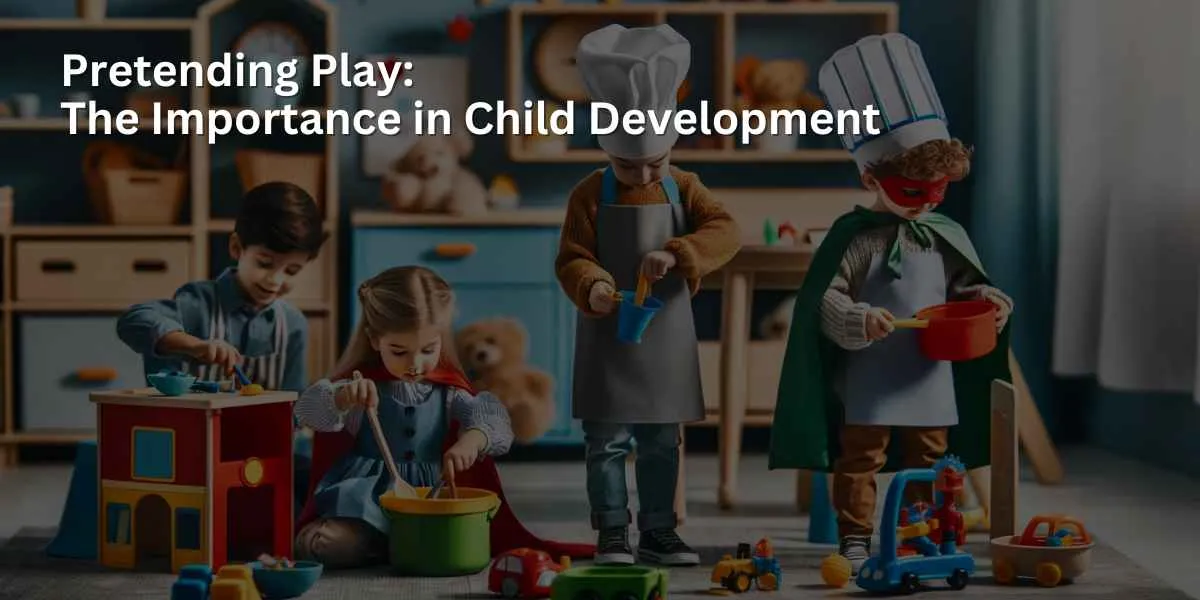Importance of Pretending Play in Child Development delves into the magical world of make-believe and its profound effects.
Did you know that when children dive into the world of pretend, they’re doing more than just having fun? They’re building essential skills that will serve them for a lifetime.
For parents and caregivers striving to understand the significance of pretend play, unraveling its multifaceted benefits is illuminating.
From nurturing creativity, enhancing social skills, to fostering problem-solving abilities, I’ve curated insights into how imaginary worlds pave the way for real-world success.
Step with me into the enchanting realms of pretend play, and let’s celebrate its transformative role in shaping young minds and hearts.
Pretend play, also known as imaginative or symbolic play, is a vital aspect of child development. It involves children using their imagination to create scenarios, roles, and actions that aren’t real but offer a window into their understanding of the world. Pretend play is more than just a fun activity; it’s a crucial developmental tool that equips children with a range of skills beneficial for their growth and understanding of the world around them.
Key Takeaways: Importance of Pretend Play in Child Development
- Cognitive Development:
- Problem Solving: Pretend play allows children to confront and resolve problems, enhancing their critical thinking skills.
- Understanding the World: It helps children process their experiences and understand the roles and norms of society.
- Social and Emotional Skills:
- Empathy and Understanding: By taking on different roles, children learn to put themselves in others’ shoes, fostering empathy.
- Expressing Feelings: Pretend play provides a safe space for children to express and manage their emotions.
- Cooperation: Playing with others requires negotiation, turn-taking, and collaboration.
- Language Skills:
- Vocabulary Expansion: Children often use new and different words related to their play scenarios, expanding their vocabulary.
- Communication: Engaging in dialogue within their imagined scenarios helps improve their verbal communication skills.
- Creativity and Imagination:
- Innovative Thinking: Pretend play encourages children to think outside the box and come up with innovative ideas.
- Role Exploration: By adopting various roles, from superheroes to doctors, children expand their imaginative horizons.
- Motor Skills:
- Fine Motor Development: Activities like “cooking” in a play kitchen or “fixing” toys can enhance fine motor skills.
- Gross Motor Development: Larger scale pretend play, like “flying” as a superhero or “jumping” as a frog, promotes gross motor skills.
- Preparation for Real-Life Situations:
- Mastery of Experiences: Pretend play allows children to process and understand real-life events, helping them cope and master their experiences.
- Role Practice: By acting out jobs like doctors, teachers, or firefighters, children become familiar with different community roles.
- Building Self-esteem:
- Achievement and Pride: Completing scenarios or stories in pretend play provides a sense of accomplishment.
- Independence: Making decisions in their play scenarios fosters a sense of independence.
The Basics of Pretend Play
Pretend play, also known as make-believe or fantasy play, is a type of play where children use their imagination to act out scenarios and play roles. This type of play is common among young children and is an essential part of their development.
During pretend play, children use toys and other objects to create imaginary scenarios and act out different roles. For example, they may pretend to be a doctor, teacher, or firefighter. Through this type of play, children can explore different roles and learn about the world around them.
Imagination is a key component of pretend play. Children use their imagination to create scenarios and come up with different ideas. This type of play helps children develop their creativity and problem-solving skills. It also helps them develop empathy and understand the perspectives of others.
Toys play a crucial role in pretend play. Children use toys to create different scenarios and act out different roles. For example, they may use a toy kitchen to pretend to cook or a doll to pretend to be a parent. Toys provide children with a way to express themselves and explore different roles and scenarios.
Pretend play, also known as imaginative play, is an essential activity for children’s development. It is a type of play where children create their own world and act out scenarios, often mimicking real-life situations. This type of play helps children develop several skills that are crucial for their overall growth and development.

Benefits and Impact of Pretend Play
Pretend play, also known as imaginative play or dramatic play, is not just a fun activity for children. It has many benefits that can positively impact their development. Here are some of the ways that pretend play can benefit your child:
| Benefit | Explanation |
|---|---|
| Cognitive Development | Pretend play enhances cognitive development by stimulating thought process and problem-solving skills. It promotes creativity, imagination, and the ability to sequence events and understand cause and effect. |
| Language Development | Pretend play provides a platform for children to expand their vocabulary and language skills. They learn to communicate their thoughts and ideas effectively, and understand the use of different tones for different situations. |
| Emotional Development | By role-playing various scenarios, children learn to express and control their emotions. They understand their feelings and develop empathy by putting themselves in the shoes of different characters. |
| Social Skills | Pretend play encourages children to interact with others, teaching them essential social skills. They learn to cooperate, share, take turns, negotiate, and resolve conflicts. |
| Problem Solving Skills | During pretend play, children often encounter ‘problems’ that they need to solve, enhancing their problem-solving abilities and decision-making skills. |
| Empathy and Understanding | Through the portrayal of different characters, children develop a better understanding of various perspectives, fostering empathy towards others. |
| Creativity and Imagination | Pretend play offers a platform for children’s creativity and imagination to flourish, encouraging innovative thinking and a creative approach to problem-solving. |
| Self-esteem and Independence | Through successful role-plays, children gain confidence and develop a sense of independence. They become proud of their accomplishments, boosting their self-esteem. |
Boosts Creativity and Imagination
Pretend play allows your child to use their imagination and creativity to come up with new scenarios and ideas. They can create their own stories and characters, which helps to develop their creativity and imagination skills.
Builds Confidence and Self-Confidence
When your child engages in pretend play, they have the opportunity to take on different roles and try out new behaviors. This can help to build their confidence and self-confidence as they explore different aspects of themselves and the world around them.
Enhances Problem-Solving Skills
Pretend play requires your child to think creatively and come up with solutions to problems that arise during play. This can help to enhance their problem-solving skills and develop their ability to think critically.
Improves Communication Skills
During pretend play, your child has the opportunity to practice their communication skills by using language and vocabulary to explain what they are doing. This can help to improve their ability to express themselves and communicate effectively with others.
Pretend play can also aid in developmental psychology aspects such as literacy development. When children pretend to read to their dolls or write a shopping list, they learn new vocabulary and begin to understand the concept of symbols, thus preparing them for reading and writing.
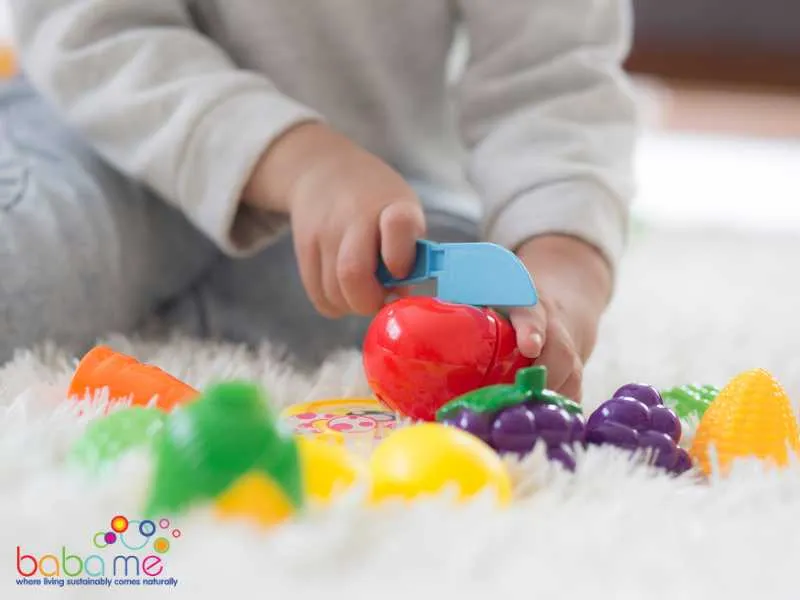
Develops Self-Regulation Skills
Pretend play requires your child to regulate their own behavior and emotions as they navigate different scenarios and interactions with others. This can help to develop their self-regulation skills and ability to manage their own emotions and behavior.
Fosters a Sense of Community
Pretend play often involves playing with others, which can help to foster a sense of community and social connection. This can help your children’s ability with social skills and build positive relationships with others.
Types of Pretend Play
Pretend play is a crucial part of a child’s development. It is a fun and engaging way for children to learn about the world around them. There are different types of pretend play, each with its own benefits. In this section, we will discuss the different types of pretend play and their benefits.
Imaginative Play
Imaginative play is when children use their imagination to create scenarios and worlds. It is a type of play that allows children to explore and experiment with different ideas. During imaginative play, children may use objects to represent other things, such as using a spoon as a microphone. This type of play helps children develop their creativity and problem-solving skills.
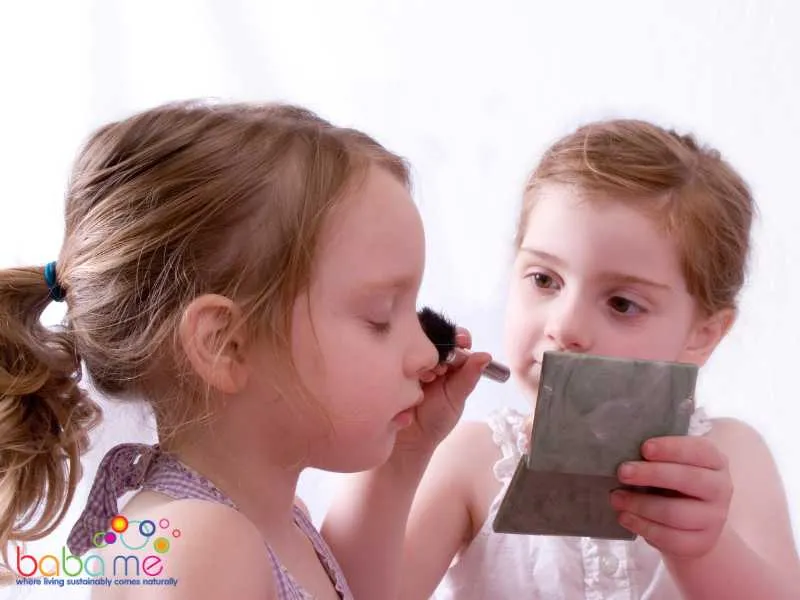
Dramatic Play
Dramatic play is when children act out real-life situations. For example, playing doctor, teacher, or chef. This type of play helps children develop their social skills, empathy, and understanding of different roles and responsibilities.
Role Play
Role play is when children take on a specific role and act out scenarios. For example, playing a superhero or princess. This type of play helps children develop their imagination, creativity, and self-confidence.
Symbolic Play
Symbolic play is when children use objects to represent other things. For example, using a block as a phone. This type of play helps children develop their language skills, as they use words to describe the objects they are using.
Sociodramatic Play
Sociodramatic play is when children engage in pretend play with others. For example, playing house or store. This type of play helps children develop their social skills, such as communication, cooperation, and problem-solving.
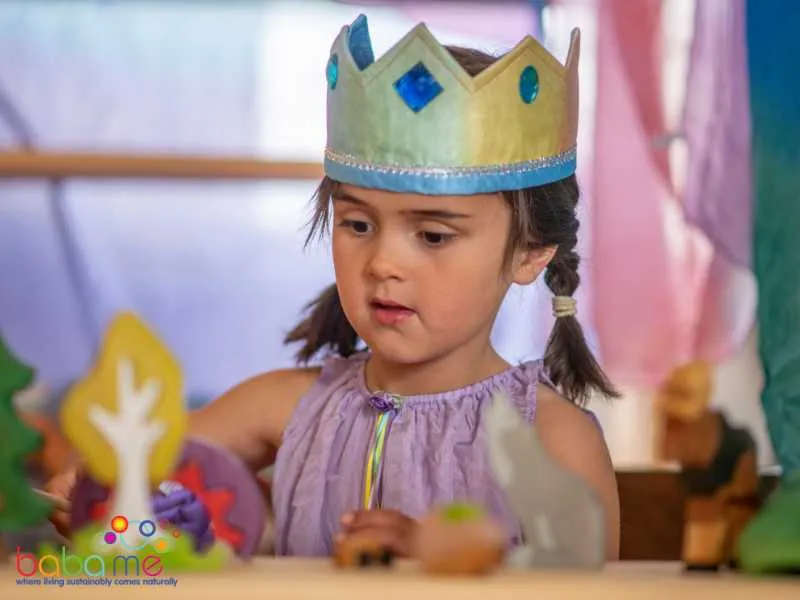
How to Encourage Pretend Play
Encouraging pretend play is vital to a child’s development. Here are some strategies that parents, family members, and caregivers can use to get a young child pretending:
It’s essential to start encouraging pretend play as early as possible for healthy child development. Even with young children, simple pretend acts can provide the foundation for future complex play. While an early childhood child may begin with merely mimicking adults, they gradually develop pretend play skills.
Doll play, for instance, is an excellent way to foster pretend play. By interacting with a doll, children can explore roles and situations they encounter in their daily lives. Other toys, like stuffed animals or action figures, also serve as props for pretend scenarios and play ideas. These toys can become characters in their imaginative stories, facilitating the child’s ability to engage in make-believe.
Ral objects can serve as pretend play props for preschool children. For instance, a toy phone or any other real object from the child’s environment can be utilized in the play. The use of these same objects in various scenarios can enhance their ability to think symbolically.
Children’s play also relies significantly on joint attention. This involves sharing focus with another individual on the same object or event. This form of social play is crucial as it promotes understanding and engagement in shared activities.
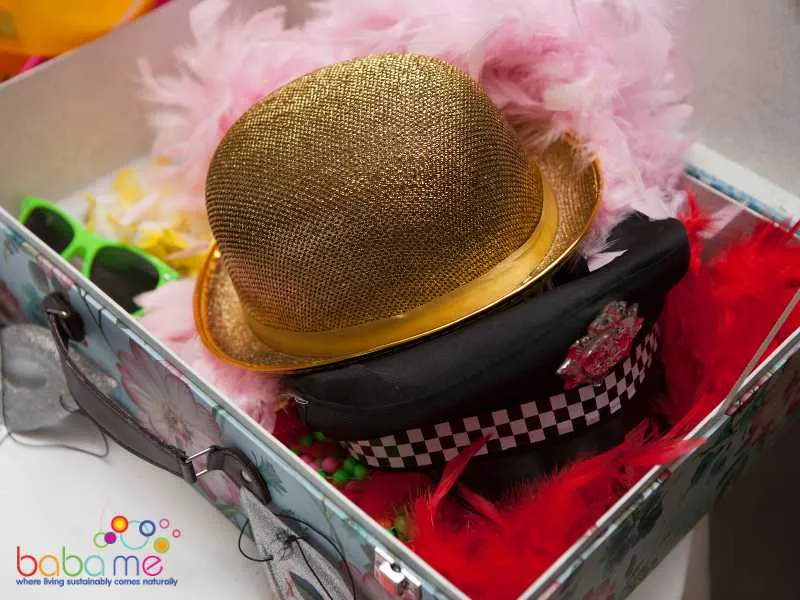
Pretend Play Tools and Props
Pretend play is an essential part of childhood development, and it is crucial to provide your child with the right tools and props to encourage their imagination. Here are some of the most popular pretend play tools and props that you can consider for your child:
Toys
Toys are a great way to stimulate your child’s imagination and encourage pretend play. Building blocks, dolls, teddy bears, and vehicles are some of the most popular toys for pretend play. Building blocks can be used to create anything from castles to spaceships, while dolls and teddy bears can be used as characters in your child’s imaginary world. Vehicles can be used to transport your child’s imaginary characters from one place to another.
Costumes
Costumes are an excellent way to help your child get into character and fully immerse themselves in their imaginary world. Whether it’s a superhero costume or a princess dress, costumes can help your child feel like they are part of their imaginary world.
Boxes
Cardboard boxes are a versatile and inexpensive prop that can be used in a variety of ways during pretend play. Boxes can be turned into anything from a castle to a spaceship to a car. Your child’s imagination is the limit when it comes to using boxes during pretend play.
Books
Books are an excellent way to inspire your child’s imagination and encourage pretend play. Whether it’s a story about a princess or a superhero, books can help your child create an imaginary world in their mind. You can also use books as a prop during pretend play by having your child act out scenes from their favorite stories.
Providing your child with the right tools and props can help encourage their imagination and make pretend play more enjoyable. Whether it’s toys, costumes, boxes, or books, there are plenty of options to choose from to help your child fully immerse themselves in their imaginary world.
FAQS on Pretend Play Activities
What are examples of simple pretend play?
Simple pretend play often starts when young children begin to use real objects in their play behaviors, such as using a toy phone or playing with stuffed animals. Even an older baby using a block as a pretend phone can be an example of the early stages of pretend play.
Why is pretend play so important?
Pretend play is vital for many reasons. It supports the development of symbolic thought, literacy development, and social skills. Children tend to practice life scenarios, adopt different roles, and engage in social play. This play form can also help in expanding a child’s vocabulary and understanding the world.
Why do kids like to play pretend?
Kids enjoy pretend play as it allows them to explore their imagination, experiment with social roles and joint attention. It provides a way for children to express their thoughts and feelings, making it an enjoyable and creative form of self-expression.

